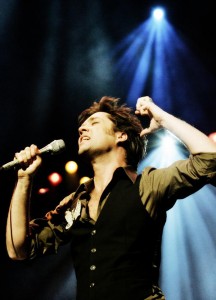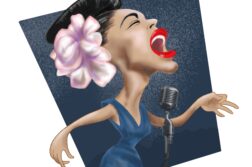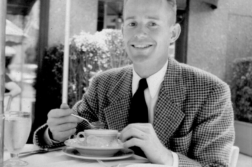Milwaukee At Last!!!
Rufus Wainwright
Decca Records
F. SCOTT FITZGERALD famously remarked that over-using the exclamation point is like laughing at your own jokes. If so, singer-songwriter Rufus Wainwright is often guilty of such self amusement: On the heels of his 2007 DVD Rufus! Rufus! Rufus! Does Judy! Judy! Judy!,Wainwright’s latest is another live album entitled Milwaukee At Last!!!
The exclamation points are quintessentially Wainwright: exuberant, provocative, over-the-top. Who else, after all, would plunk himself smack down in the middle of the Midwest and perform a song like “Going to a Town,” in which he decries American culture as hypocritical and homophobic? “Tell me, do you really think you’ll go to hell for having loved?” he asks. “You took advantage of a world that loved you well/ I’m so tired of you, America.” Wainwright might also be the most important gay musician at work today, not withstanding Elton John and George Michael. John himself, removing the modifier “gay,” has praised Wainwright as the “greatest songwriter on the planet.”
Milwaukee At Last!!! was recorded in 2007
 performed in lederhosen on David Letterman), is also the name of Wainwright’s last studio album, and this big number, horn section and all, is a plea for Hollywood to demolish its closet and let its gay actors live openly. “Release the gates and let them all come out,” he sings, for “without them, there would be no Paramount.” Having been out of the closet ever since he debuted in 1998, Wainwright is just the star to make this demand. His show also includes the song “Gay Messiah,” which yokes the sacred and the profane by imagining the titular savior, “reborn from 1970’s porn” on “the sand of Fire Island shore.” Of course, Wainwright can’t resist the urge to self name-drop: “No, it will not be me/Rufus the Baptist I be.”
performed in lederhosen on David Letterman), is also the name of Wainwright’s last studio album, and this big number, horn section and all, is a plea for Hollywood to demolish its closet and let its gay actors live openly. “Release the gates and let them all come out,” he sings, for “without them, there would be no Paramount.” Having been out of the closet ever since he debuted in 1998, Wainwright is just the star to make this demand. His show also includes the song “Gay Messiah,” which yokes the sacred and the profane by imagining the titular savior, “reborn from 1970’s porn” on “the sand of Fire Island shore.” Of course, Wainwright can’t resist the urge to self name-drop: “No, it will not be me/Rufus the Baptist I be.”
Musically speaking,Wainwright was born with a silver microphone in his mouth. His parents, Loudon Wainwright III and Kate McGarrigle (half of the McGarrigle Sisters), are musicians in their own right.When Rufus was two, in 1975, Loudon wrote a comic folk song about his son’s attachment to breast-feeding titled “Rufus Is a Tit Man.” Now 36, Wainwright has returned the favor, creating Oedipally-charged songs like “Dinner at Eight” about his father (“So put up your fists/ And I’ll put up mine”) and “Beauty Mark” about his mother (“I may not be so manly/ But still I know you love me”). His sister Martha is the family diva who, after years of singing backup for Rufus, released the most memorable album title of 2008: “I Know You’re Married But I Have Feelings Too.” What sets Rufus apart, however, is his unusual sound, a fusion of pop and opera that’s been called “popera,” sung in a doleful baritone with lyrics often sublimely slurred.
Lush and layered, the songs that comprise his companion albums, “Want One” (2003) and “Want Two” (2004), his most ambitious to date, document Wainwright’s own struggles with substance abuse. In 2009, he made his first foray into opera by composing “Prima Donna,” about a day in an opera singer’s life, which premiered at the Manchester International Festival. But if overstatement is what Wainwright does best—performing at the London Palladium, he donned a gold suit with a butterfly brooch and quipped, “Yes, I’m a homosexual and I like to assault people with glamour”—he’s also capable of understatement.
In a song called “Sanssouci,” he confesses: “I’m tired of writing elegies in general.” This is a significant admission, because the queerish elegy is what Wainwright does best, as in the songs “Peach Trees” (for James Dean), “Memphis Skyline” (for Jeff Buckley), “Matinee Idol” (for River Phoenix), and even “Grey Gardens” (for the two Edith Beales). But the riskiest tribute of all was undoubtedly Wainwright’s bold re-enactment of Judy Garland’s 1961 performance at Carnegie Hall. Bound up with Garland’s image, for him, was America in its heyday. “Whenever I put on the Judy record, the 1961 concert,” he told the Independent, “I was instantly reminded of how great this country can be and all the sophistication and glory that it once represented. So it was my way of holding on to the American Dream.”
The problem with Milwaukee at Last!!! lies in the fact that its eleven tracks don’t expand upon the sound palette already familiar to Wainwright’s fans and followers. Even “The Art Teacher,” already released as a live version on “Want Two,” is performed in the same style as before. In contrast, when Wainwright performed with Ben Folds in 2005 at the Wiltern in Los Angeles, he rearranged the original with a livelier rock percussion, and such rearrangements are wanted here. What you can’t take away from Rufus Wainwright is that he always performs with “perfect harmony” and “rhapsody divine,” which are two lyrics from another extravagantly punctuated song title, made famous by Garland only to be reinvented by Wainwright: “Zing! Went the Strings of My Heart.”
Colin Carman teaches English literature at Colorado Mountain College.





